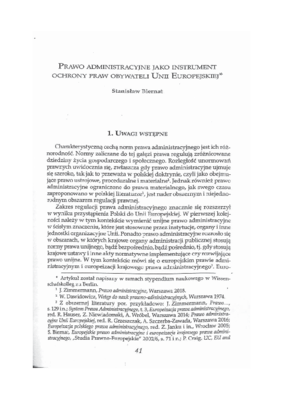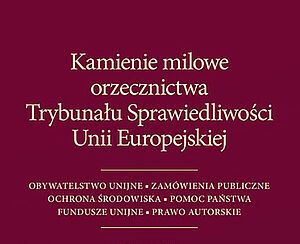
Stanislaw Biernat, Dr. Dr. h.c.
Professor für Rechtswissenschaft
Jagiellonian University in Kraków
Geboren 1949 in Tarnów, Polen
Studium der Rechtswissenschaft an der Jagiellonian University in Kraków
Project
Herausforderungen und Gefahren für die Rechtsstaatlichkeit in der EU
In den letzten Jahren sind in einigen EU-Mitgliedsstaaten systemische Verletzungen der Rechtsstaatlichkeit und besonders der gerichtlichen Unabhängigkeit zu beobachten. Es sei dabei hervorgehoben, dass die Rechtsstaatlichkeit einer der Werte ist, auf die sich die Union gründet. Gegenstand des Forschungsvorhabens sollen der Versuch einer Verifizierung der Bedeutung der Rechtsstaatlichkeit als EU-Wert sowie eine kritische Analyse von Verfahren zum Schutz der Rechtsstaatlichkeit und der Unabhängigkeit von Gerichten sein. Einige dieser Verfahren wurden vor Kurzem erstmals in der Geschichte der EU eingeleitet.Im Jahre 2018 gewann der Schutz der Rechtsstaatlichkeit neue Perspektiven durch die neue, die Rolle der Unabhängigkeit nationaler Gerichte als unabdingbare Voraussetzung für wirksamen Rechtsschutz in den vom Unionsrecht erfassten Bereichen betonende Rechtsprechung des EuGH. Nationale Gerichte samt EuGH werden allmählich als ein einheitliches, der Wahrung des EU-Rechts dienendes institutionelles System betrachtet. Forschungsgegenstand sollen die durch diese neue Rechtsprechung gebotenen Chancen sein und insbesondere die Methoden zur Verifizierung des Umfangs der Unabhängigkeit nationaler Gerichte sowie der Skala und Formen deren Verletzung. Auf dieser Grundlage werden Schlussfolgerungen hinsichtlich der Grenzen der zulässigen gerichtlichen Zusammenarbeit sowie des Grundsatzes des gegenseitigen Vertrauens und Anerkennung von Entscheidungen formuliert werden können. Des Weiteren soll die Rolle des Vorabentscheidungsverfahrens in diesem Kontext unter zwei Aspekten untersucht werden: Welchen Voraussetzungen muss ein Organ des Mitgliedstaates genügen, um als zur Anrufung des EuGH befugt angesehen zu werden, und wie ist der Umfang der zulässigen Kontrolle durch den EuGH in dem hier besprochenen Verfahren der Achtung der Unabhängigkeit nationaler Gerichte.
Die letzte Frage gilt der Relation zwischen den politischen und gerichtlichen Instrumenten im hier besprochenen Kontext.
Lektüreempfehlung
Biernat, Stanislaw und Dorota Dabek. "Verwaltungsrecht in Europa: Grundzüge - Polen." In Handbuch Ius Publicum Europaeum, Band V, herausgegeben von Armin von Bogdandy, Sabino Cassese, Peter M. Huber, 477-559. Heidelberg: C. F. Müller, 2014.
-. "Wplyw prawa Unii Europejskiej na zródla prawa administracyjnego i procedure prawodawcza" [Einfluss des EU-Rechts auf die Rechtsquellen des Verwaltungsrechts und das Rechtssetzungsverfahren]. In System prawa administracyjnego: Europeizacja prawa administracyjnego, Band 3 [Das System des Verwaltungsrechts: Europäisierung], herausgegeben von Roman Hauser, Zygmunt Niewiadomski und Andrzej Wróbel, 555-616. Warszawa: C. H. Beck, 2014.
-. "Offene Staatlichkeit: Polen." In: Handbuch Ius Publicum Europaeum, Band II: Offene Staatlichkeit - Wissenschaft vom Verfassungsrecht, herausgegeben von Armin von Bogdandy. Pedro Cruz Villalón und Peter M. Huber, 243-275. Heidelberg: C. F. Müller, 2007.
Colloquium, 06.12.2018
The Rule of Law and its Enemies
The nationalist and populist moods in Europe and beyond can be observed more and more clearly. They embrace large social groups, often represented by political parties. Authoritarian or near-authoritarian governments hold power in several European countries. In other countries, populist parties have strong support in the parliamentary elections, though (still?) insufficient to belong to the ruling coalition.
In countries with authoritarian tendencies, the principles of democracy and rule of law are being violated. One of the manifestations of this phenomenon is the limiting of the independence of judiciary. A characteristic example is the current situation in Poland.
According to the European treaties, democracy and the rule of law are among the fundamental values on which the European Union is founded. With regard to EU Member States, the problem therefore arises of the degree to which and with what means the Union (its institutions) and other Member States can and should react to the violation of the principles of democracy and the rule of law, including the limiting of the independence of courts in a given "troublesome" Member State.
This issue has been the subject of a lively discussion among politicians and scholars for some time now. The situation in this area is dynamic and changeable. Every year, and now even sometimes a single month or week (!), adds new impulses and elements to this discussion. It is characterized by the increasing activity of EU institutions (European Commission, Council of the European Union, European Parliament, Court of Justice) and their use of legal instruments and procedures, sometimes for the first time in the history of the Union.
Assessments of the activities of EU institutions can be made in different contexts. One of these is the scope of the Union's competence to intervene in the judiciary system of Member States, which used to be treated as an internal sphere of the state falling within the scope of its sovereignty. In this context, one can note the significant breakthrough that occurred in the jurisprudence of the Court of Justice at the beginning of 2018. Another context is the assessment of the effectiveness of EU instruments and procedures depending on various factors, including on the political will of the Union's institutions and the Member States.
The discussed issues are an attractive field for scientific research for political scientists and lawyers. It is difficult to make profound assessments and generalizations in the current dynamic and fast-changing circumstances. However, it is possible and useful to compile catalogs of problems to be solved, formulate research hypotheses and try to determine scenarios for future events.
Undoubtedly, ensuring respect for the rule of law and the independence of the judiciary in the Member States is important for the future of the Union in a difficult time when it is struggling with many other problems (e.g. Brexit, the new attitude of the US administration, the growing economic power of China).
Publications from the Fellow Library
Biernat, Stanislaw (Warszawa, 2020)
Podstawy i źródła prawa Unii Europejskiej System Prawa Unii Europejskiej ; t. 1
Biernat, Stanislaw (Warszawa, 2019)
Prawo administracyjne jako instrument ochrony praw obywateli Unii Europejskiej
Biernat, Stanislaw (Warszawa, 2019)
Biernat, Stanislaw (2015)
Kontroversen in Polen um die Charta der Grundrechte der Europäischen Union
Biernat, Stanislaw (2012)
Der Name des Unionsbürgers : eine Frage auch des EU-(Wirtschafts-)Rechts?
Biernat, Stanislaw (2011)
The status of the principle of primady in the Lisbon Treaty architecture


